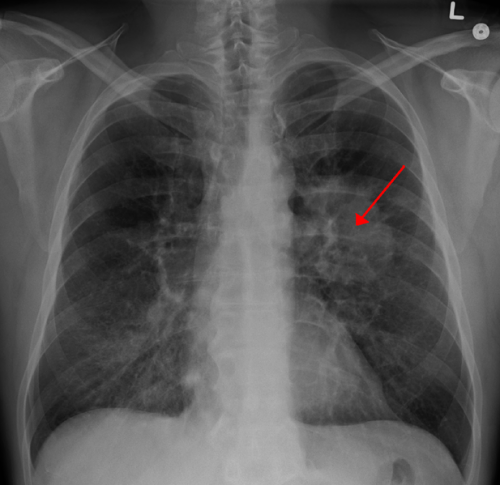Two-drug immunotherapy deemed safe for lung cancer patients, study shows

Small cell lung cancer (SCLC) represents approximately 14 percent of all types of lung cancer. Many patients with SCLC respond to initial chemotherapy; however, they eventually relapse and develop progressive disease that has no effective treatment options. A new Moffitt Cancer Center study being presented at the American Society of Clinical Oncology (ASCO) Annual Meeting in Chicago and published in The Lancet Oncology shows that utilizing the immunotherapeutic agents nivolumab and ipilimumab could lead to more effective treatment options for SCLC patients who fail initial therapy.
A new era in cancer therapeutic strategies has recently emerged with the approval of new agents that function by stimulating the immune system to target cancer cells.
Nivolumab blocks the activity of a molecule PD-1 found on T cells, and is approved for advanced non-small cell lung cancer, melanoma and renal cell carcinoma patients. Ipilimumab targets a molecule called CTLA-4 on T cells and is approved for advanced melanoma patients.
Studies have shown that nivolumab combined with ipilimumab results in improved antitumor activity when compared to either agent alone. The Food and Drug Administration recently approved this two-drug combo for the treatment of advanced melanoma.
Given the promising activity of the immunotherapy combination in melanoma, researchers wanted to assess if this regimen could also be effective in other types of tumors that have few to no therapeutic options.
Moffitt participated in a phase 1/2 international study (Checkmate 032) to assess the activity and safety of nivolumab and ipilimumab in 216 patients with SCLC who developed progressive disease after prior standard chemotherapy. Patients received either nivolumab therapy as a single agent, or two different combination regimens of nivolumab plus ipilimumab.
The researchers reported that nivolumab and the combination regimen were active in SCLC patients and resulted in responses that lasted longer than many other investigational agents. Ten percent of patients treated with single-agent nivolumab responded to therapy, while approximately 20 percent of patients treated with nivolumab combined with ipilimumab responded. Furthermore, 16 patients maintained their response for longer than 6 months.
Preliminary results suggest that the immunotherapeutic regimens are active in patients who are particularly difficult to treat, with responses observed in patients who were resistant to initial standard chemotherapy and in patients who had two or more prior treatments.
SCLC patients tolerated the treatment well, with 13 to 30 percent of patients treated with the nivolumab or the combination regimens having high-grade toxicities. The most common toxicities associated with treatment were altered pancreatic enzyme activity, diarrhea, difficulty breathing and lung tissue inflammation.
"This is the first trial showing activity of nivolumab and nivolumab plus ipilimumab in SCLC, in a hard-to-treat population of patients with limited treatment options," said Scott J. Antonia, M.D., Ph.D., first author of the study and chair of the Thoracic Oncology Department at Moffitt.
On the basis of these encouraging results, two phase 3 studies are ongoing to assess the therapeutic impact of nivolumab and nivolumab plus ipilimumab in patients with SCLC.
Results from the Checkmate 032 study, funded by Bristol-Myers Squibb, will be presented at ASCO at 8 a.m. Saturday, June 4, in Hall D1 at McCormick Place. It can also be found in the June issue of Lancet Oncology.
















